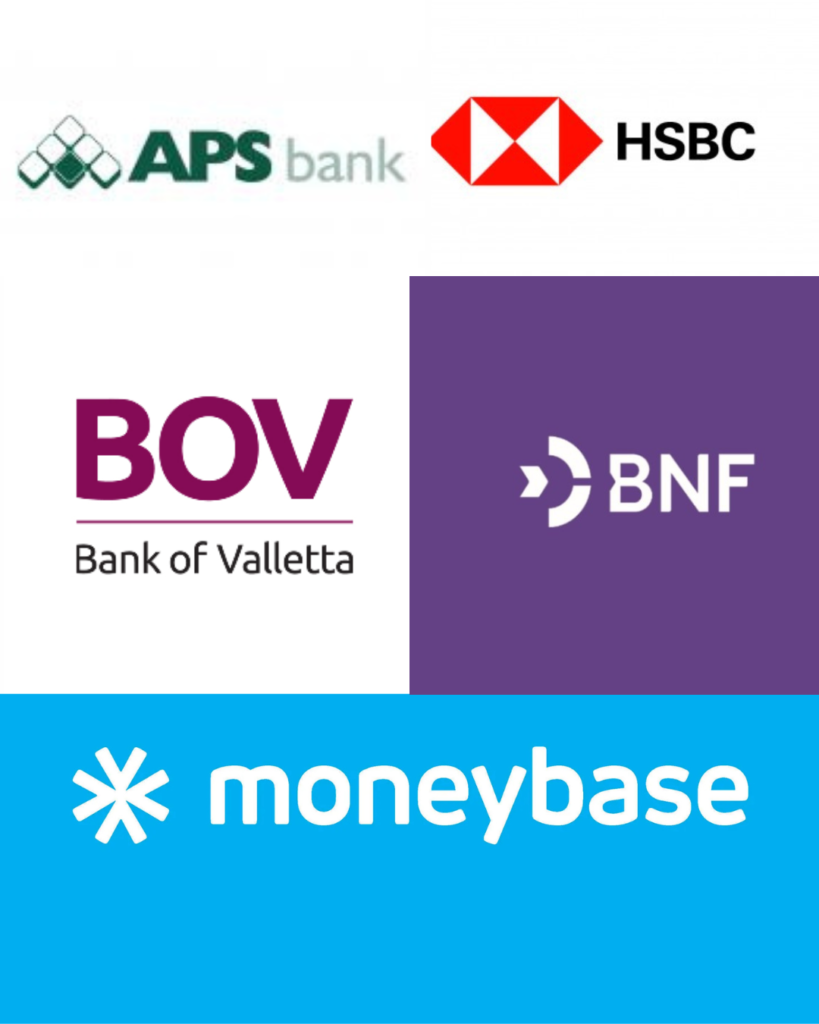One of the first things you’ll probably need to sort out when moving to Malta is opening a bank account. It might not be the most exciting part of relocating, but it definitely makes life a lot easier, especially when it comes to getting paid, paying rent, or just avoiding extra fees.
I know the process can feel a bit confusing at first, so I put together this guide to help make things clearer and hopefully save you some time (and stress).
Can Expats Easily Open a Bank Account in Malta?
Opening a bank account in Malta as an expat is not as difficult as it may seem. While requirements may differ slightly from one bank to another, the process is generally straightforward if you come prepared. Most banks will require basic documents like a valid ID, proof of address, and, in some cases, a reference letter.
To speed things up, you can book an appointment in advance and arrive early with all the necessary paperwork. Here are the steps you’ll be required to take:
- Maltese ID or Passport: Make sure you have either a Maltese ID card or a passport. It’s better to use the ID card if you have one because it makes things easier. You’ll need one of these to live in Malta anyway. So, it’s a good idea to wait until you have your ID card sorted before you try to open your bank account. Here’s more information on type of visas and residency programmes in Malta.
- Get a Reference: If you have an ID card, you can get a reference from various places like your employer, a bank, or a lawyer. The easiest option is usually your employer. They can provide a reference on their official company letterhead.
- Fill Out a Form: You’ll need to complete a form from the bank. They’ll send it to you by mail. This form will ask for details like your name, address, and salary. If you don’t have an ID card, you’ll also need a reference from your bank. If you can’t provide one, the bank will contact your bank directly. Be aware that this process might take some time.
An Overview of the Available Banks in Malta
Let’s have a look at the available banks in Malta, and an overview about each bank.

1. BOV (Bank of Valletta)
For expats looking to open a bank account in Malta, Bank of Valletta (BOV) is a popular option, particularly for those working in the gaming industry. BOV has strong connections with gaming companies on the island, which makes it a convenient option for individuals in this sector. This relationship often results in quicker wage processing, which is definitely an advantage for those employed in the gaming field.
BOV bank provides a variety of accounts, such as personal, business, and savings accounts, to meet different needs. Expats can take advantage of the bank’s comprehensive services, including online banking, debit and credit cards, and foreign currency accounts.
2. HSBC
HSBC Malta does not provide banking services to gaming companies due to their high-risk nature. However, individuals employed by gaming companies can generally open personal accounts without any issues.
If you already hold an HSBC account in another country, transferring your account to HSBC Malta is a straightforward process. The bank offers a free switching service that includes transferring your balance, setting up regular payments, and providing access to their online banking services, debit and credit cards, and savings options. Simply inform your current HSBC branch of your intention to switch, and they’ll guide you through the process smoothly.
3. BNF Bank
BNF Bank is a good option for expats in Malta, with a simple account opening process that doesn’t need a reference letter from another bank. But keep in mind, BNF doesn’t give out reference letters either, which might make it harder if you want to change banks later on. They’ve also launched a new online banking platform called eBNF and switched from VISA to MasterCard to make banking smoother and more secure.
4. APS Bank
APS Bank is a locally owned financial institution in Malta that offers a range of services to expatriates, including current and savings accounts, personal loans, and home loans. Known for its favorable approach to lending, APS is particularly appealing to expatriates seeking loans, offering competitive terms for personal and home loans with interest rates starting as low as 4.9%.
APS also provides attractive options like the Green Home Loan, which offers discounted rates for energy-efficient homes. While their smaller branch network may limit accessibility compared to larger banks, APS remains a solid choice for expats, particularly those planning a long-term stay in Malta and in need of financial assistance.
5. Moneybase
A newer and innovative addition to Malta’s banking scene, Moneybase is a digital financial platform that offers a comprehensive suite of services. With a Financial Institution license, Moneybase provides users with:
- Instant payments: Fast and secure transactions.
- Physical and virtual cards: Both MasterCard options are available for easy payments.
- Investment opportunities: Access to over 20,000 investment options, including stocks and ETFs.
- Multicurrency wallet: Allows users to hold and manage multiple currencies.
- Competitive currency rates: Beneficial for international transactions.
Moneybase is a great option for digitally minded users who want a smooth, digital-first banking experience. Their app is super easy to use, and support is available seven days a week. Right now, there’s a cashback offer: if you make at least five transactions a week totaling €150 or more with your Moneybase MasterCard, you’ll get €10 back every Monday.
This promo runs until 28 October 2025 and is open to Maltese residents. Keep in mind, ATM withdrawals and money transfers don’t count. There’s also a welcome bonus — €75 if you deposit your salary or pension into your account, or €60 if you’re a student receiving your stipend through Moneybase. Just make sure you’re always using their official platform to stay safe from scams.
Important Note: It's important to know that banks in Malta don't open full-time. Usually, they're open from 8:00 AM to 1:00 PM.
Tips & Checklist for Opening a Bank Account in Malta
| Step | What You Need | Additional Notes |
|---|---|---|
| 1. Gather Identification | Passport (or Maltese ID card if available) | Ensure your passport is valid for at least 6 months. |
| 2. Proof of Address | Utility Bill (e.g., water, electricity, internet) or Government Letter | Should be recent (within the last 3 months). |
| 3. Proof of Residency | Residence Permit or Visa Details | Needed for non-EU residents. |
| 4. Tax Identification | Tax ID Number (TIN) | Required for tax reporting and official documents. |
| 5. Bank Reference | Employer Letter or Reference from Previous Bank (if applicable) | Some banks may require it, especially for newcomers. |
| 6. Choose Your Bank | Options include BOV, HSBC, APS Bank, BNF Bank | Check if your chosen bank has special requirements. |
| 7. Visit the Bank | Go to the bank branch with your documents to fill out the required forms. | Most banks operate from 8:00 AM to 1:00 PM (weekdays). |
| 8. Consider Revolut | Revolut Account for quick setup if traditional banking is too time-consuming. | Confirm salary transfer possibilities with your employer. |
| 9. Ensure ATM Access | Make sure you have access to ATMs in your area; consider BNF’s Euronet ATM network. | Plan ahead, as ATMs are not always near. |
| 10. Cash or Card | Carry cash as many smaller shops and restaurants prefer cash payments. | Cards may have a minimum spend requirement (€10-€20). |
Details About ATMs in Malta
Limited Availability: There is a noticeable shortage of ATM cash machines across Malta. Typically, you’ll find them located outside of banks, mainly in popular areas. However, it’s important to note that you may not always have easy access to an ATM within walking distance. It’s advisable to plan ahead and ensure you have enough cash on hand at all times.
Cash Preference: Malta still relies heavily on cash transactions, lagging behind in the adoption of card payments. It’s common for establishments, including restaurants, not to accept cards, which may come as a surprise when it’s time to settle the bill. Additionally, many places enforce a minimum card spend ranging between €10 to €20.
Limited Contactless Options: Despite advancements in payment technology elsewhere, contactless payment methods are not widely available in Malta. Therefore, don’t rely on contactless payment options during your stay.
A Quick Recap
Opening a bank account in Malta as an expat is generally straightforward, but there are a few key things to keep in mind. While you can open a conventional bank account, digital banks like Revolut and Moneybase are becoming more popular. Revolut, from Lithuania, lets you set up an account in minutes, with a proper IBAN and quick access to funds.
Moneybase, a newer digital bank, offers fast payments, virtual cards, and the ability to manage multiple currencies, making it ideal for expats who prefer a digital-first approach. Though some employers might be hesitant to pay into digital accounts, many are starting to accept them, making these options increasingly viable.
Do You Need Help with Relocating in Malta?
At Expatax Malta, we collaborate with trusted professionals to assist expatriates relocating to Malta for opening a bank account, visa and residency purposes, purchasing their new homes, tax consultation, and more. If you require any of these services, don’t hesitate to reach out. We’re here to support you!







